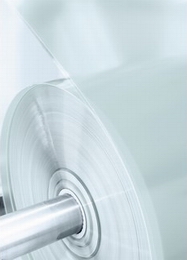 The European Food Safety Authority (EFSA) gives Holfeld’s exclusive Diamat technology the thumbs up to key in house decontamination processes leading to the successful production of PET sheets with up to 50% recycled post consumer PET.
The European Food Safety Authority (EFSA) gives Holfeld’s exclusive Diamat technology the thumbs up to key in house decontamination processes leading to the successful production of PET sheets with up to 50% recycled post consumer PET.It has taken Holfeld Plastics 18 months to secure this leading position in the production of food contact PET. The decontamination process is the nub; it involves 50% r-PET and 50% virgin flake (no more than 5% non food consumer waste) being heated in a reactor resulting in the crystallisation of the flake. The flakes are then decontaminated through two consecutive extrusion steps including multiple vacuum degassing.
Food contact PET sheets are then extruded. These are examined in a rigorous quality control environment for intrinsic viscosity, colour, deformities, blemishes and black specks. The approved sheets are then formed into trays and punnets for the red meat, poultry, fish and fresh produce market sectors.
The EFSA said "The Panel considered that the process is well characterised and the main steps used to recycle the PET flakes into decontaminated PET sheets are identified. After having examined the challenge tests provided, the Panel concluded that Step 3 (two consecutive extrusions including multiple degassing) is the critical step for the decontamination efficiency of the process…. the Panel considered that the recycling process is able to reduce any foreseeable accidental contamination of the post-consumer contact PET to a concentration that does not give rise to concern for a risk to human health>"
Dr Pat Ward of Holfeld Plastics commented "This is a major breakthrough for Holfeld. With today’s accent very much on decontamination and food safety, this process will allow our customers and the consumer absolute trust in Holfeld’s meat and fresh produce trays. It also means that any manufacturer using Holfeld PET sheets can be assured of a level of sheet integrity that is second to none."





